Where Do Clinical Trials Fit Into an AML Treatment Plan?
Where Do Clinical Trials Fit Into an AML Treatment Plan? from Patient Empowerment Network on Vimeo.
AML expert Dr. Eunice Wang discusses the role that clinical trials play in advancing research, the benefits of participation in research, and explains why she recommends trials for AML patients.
Dr. Eunice Wang is the Chief of the Leukemia Service and Professor of Oncology at the Roswell Park Comprehensive Cancer Center in Buffalo, New York. Learn more about Dr. Wang, here.
Related Resources:
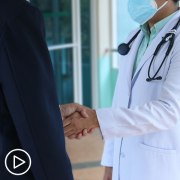
|
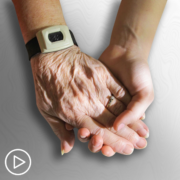
|
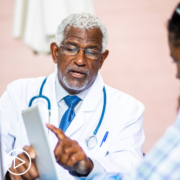
|
Transcript:
Katherine:
Where do clinical trials fit in when it comes to choosing treatment?
Dr. Wang:
Clinical trials are the mainstay of everything that we do in cancer care. Every single cancer drug that we’ve developed dating back into the 1970s at the National Institute of Health is the result of some patients and some doctors designing a clinical trial. These FLT3 inhibitors were developed over the last several years, so when I first came out of fellowship and started my training, we didn’t have these targeted therapies. Since 2017, in four years, we’ve had nine different drugs approved.
So, clinical trials are the way that we go from a finding in the laboratory to somebody having an extra birthday or going to their son or daughter’s wedding. That’s really how important it is, and those brave individuals who participate in clinical trials are helping not only themselves, but helping other people. I can’t tell you how many patients I enroll in clinical trials for AML, and I have told them – I said, “These nine drugs that we approved were because of nine different clinical trials which demonstrated benefit involving hundreds of thousands of patients.”
I can’t tell you how many times I’ve had a patient say to me, “Look, doctor, I’m going to participate in this clinical trial so that even if I’m not helped, you could learn something from me that could help the next person with their disease.” People are incredibly unselfish when it comes to clinical trials. I recommend a clinical trial for all my patients because I feel like that’s the cutting-edge clinical care.
I had patients here who I had on clinical trial drugs, and I was able to go to them and say, “Good news: Your drug has now been approved.” And, they say, “Doctor, why? I’ve been on this drug for a year.” And, I said, “That’s right, because you were part of that clinical trial, and you’re here now because of that drug, and now, a year or two later, that drug’s potency has been recognized, and now, the fact that you were in that trial has really helped us get this approval, which is going to help every other patient with that disease going down the line.” So, very important.
Shared Decision-Making, Advice for Partnering With Your AML Team
Shared Decision-Making, Advice for Partnering With Your AML from Patient Empowerment Network on Vimeo.
AML expert Dr. Eunice Wang reviews how shared decision-making impacts overall care by keeping the individual patient and their unique circumstance in mind when determining a treatment path. Dr. Wang discusses the importance of reviewing clinical factors as well as having honest conversations, giving the patient a voice in their care.
Dr. Eunice Wang is the Chief of the Leukemia Service and Professor of Oncology at the Roswell Park Comprehensive Cancer Center in Buffalo, New York. Learn more about Dr. Wang, here.
Related Resources:
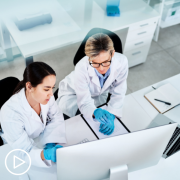
|
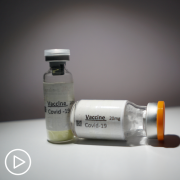
|

|
Transcript:
Katherine:
We’ve been hearing a lot lately about shared decision-making. In your opinion, how is this concept best put into practice?
Dr. Wang:
So, shared decision-making is the process where the physician is no longer dictating the care, and telling patients, “This is the best therapy for you,” and just plowing forward with it. Shared decision-making is really what we want in all of our relationships in our lives, which is sitting down and incorporating many points of view, including both the patient’s wishes and desires as well as those that he or she feels is important to his or her care.
It involves time. It does – it may involve multiple clinic visits. It involves sitting back and having the physician say, “This is the information, this is the data. What is important to you? What is going to work with your particular home situation and family situation and dynamic?”, and then, together, coming up with a decision about care that is individualized for the patient. We talked about individualizing the targeted therapy for the biology of the disease.
Shared decision-making is individualizing the treatment decision for the individual patient and their particular circumstance, and that is best done by sitting down with the patient, looking them in the face, not by looking at your phone, or staring at that computer screen, or reading off some diagnosis from a piece of paper. It’s really involving having those honest conversations.
That’s how things used to always be in medicine, is that it always used to be a decision where the doctor and you would talk and come to a decision, potentially. We’ve kind of gotten away from that with all the electronics and technology, and I think the shared decision-making is a conscious effort by individuals and groups to bring that back in case. It’s very important for AML. AML is a disease that affects largely older individuals, so if you’re in your 60s and 70s and 80s, I can tell you right now that each one of those individuals who have lived decades of life have a certain way that they want to live whatever time they have left.
Katherine:
Of course. Well, when considering a treatment plan, what key questions should patients be asking?
Dr. Wang:
They should be asking – it should be – they should be asking, “How is this going to affect my daily life?” They should be asking questions – “Do I have to be in the hospital? How – do I need to come to the clinic? If I have to come to the clinic, how many times do I have to come to the clinic?”
In my part of the world, it – sometimes even the season in which they’re being diagnosed can impact what disease treatment they want because certain times of the year, travel back and forth in different weather conditions can be difficult. They need to be asking not the question of – that we get asked a lot like, “What would you do if this was your father or your mother?”, but I wouldn’t know.
I turn that around and I say, “But, you’re not my father and you’re not my mother, and if you were my father or my mother, I would ask my father or my mother, ‘What is going to work for you? What are your goals? Do you want aggressive therapy? Do you want to go for high risk/high benefit, or do you want something that’s just going to make you be able to be outpatient for longer, and really what is the most important thing for you and your family right now when we look ahead as to the treatment path?’”
Katherine:
Why is it important for patients to feel like they have a voice in their treatment decisions?
Dr. Wang:
It’s important for them to have a voice in their treatment decision because it is their – first of all, it’s their life, it’s their body. They are the ones that are going to be getting the therapy, suffering the consequences, and making the decisions that can impact not only them, but their loved ones, so – and, I find that the more they understand the disease process, the more they understand and can communicate to me their wishes, the more satisfied we are in care. I’ve had individuals tell me early on in the process where maybe, in a different patient, I would have suggested a second or third treatment – I’ve had them say to me, “I’m done. I’m not – thank you very much.” And, we all have to respect that.
It makes people more satisfied with their care. It makes people feel like they are making – they are guiding the path. They’re not just doing what their husband wants or what their doctor wants. I never want to have a patient say, “Well, I went and got chemo, Dr. Wang, because you wanted me to get chemo.” I don’t want you to get chemo, and I feel like if you have that understanding, I think patients are much more likely to pursue therapy and for the therapy, I think, to be successful or not. But, regardless of whether it’s successful medically, it needs to be successful emotionally for that patient and for that family.
NCCN Guidance on Safety and Effectiveness of COVID-19 Vaccines for Cancer Patients
NCCN Guidance on Safety and Effectiveness of COVID-19 Vaccines for Cancer Patients from Patient Empowerment Network on Vimeo.
Is the COVID-19 vaccine recommended for people living with cancer? Dr. Erin Roesch shares recommendations from the National Comprehensive Cancer Network (NCCN) for those undergoing cancer treatment, including guidance on mask wearing and advice for family members.
Dr. Erin Roesch is a breast medical oncologist at the Cleveland Clinic. Learn more about Dr. Roesch here.
Transcript:
Katherine:
Many cancer patients have questions about the COVID vaccine. Is it safe? Do we need to continue wearing masks? Here to address these questions is cancer expert, Dr. Erin Roesch. Dr. Roesch, would you introduce yourself?
Dr. Roesch:
Hello. And thank you for inviting me to participate in this very important conversation. My name is Erin Roesch. I am a breast medical oncologist at Cleveland Clinic.
Katherine:
Excellent. Thank you so much for joining us today. I’d like to run through a list of concerns that cancer patients have about vaccines in general and the COVID vaccine specifically.
So, let’s start with a basic question. Should people get vaccinated if they have cancer?
Dr. Roesch:
Yes. All individuals diagnosed with cancer should get the COVID-19 vaccine as recommended by the National Comprehensive Cancer Network or NCCN.
An immunocompromised state makes many people with cancer at higher risk of serious COVID-19 illness. Those who are vaccinated are less likely to become sick with COVID-19. And, also, vaccinated people who do get COVID-19 are much less likely to become seriously ill.
I would also mention that those living in the same household as a person diagnosed with cancer and caregivers or other close contacts should also get vaccinated.
Katherine:
Another common question is whether people with cancer should wait for any reason to get the COVID-19 vaccine.
Dr. Roesch:
Most people with cancer should get the vaccine as soon as they can with a few exceptions according to NCCN.
People in the process of receiving stem cell transplant or cellular therapy should wait at least three months after they finish treatment to get vaccinated.
Those diagnosed with certain forms of leukemia should also wait a few weeks after receiving treatment to allow their immune system to recover so the vaccine can be effective.
It’s not been clearly defined exactly how chemotherapy affects responses to COVID-19 vaccines. But some data suggests that immune responses may not be as robust. However, it is still recommended that those receiving chemotherapy and also immunotherapy and radiation should get vaccinated whenever they can.
Katherine:
I think a lot of people are concerned too about whether one vaccine is better than another. What would you say to them?
Dr. Roesch:
And that is a common question that I often get in my clinic. And I advise my patients to receive or take whatever vaccine they are offered.
We don’t really have any studies or data at this point suggesting one being better than another in cancer patients.
Katherine:
Some people are wondering if the vaccine can give a person COVID-19. How would you address that?
Dr. Roesch:
I would say that as none of the currently available vaccines are made with a live virus, the vaccine itself can’t give a person COVID-19. By getting vaccinated, actually, those who are immunocompromised are really helping society to prevent the spread of COVID-19. Immunocompromised people who get COVID-19 may be more likely to infect others due to prolonged shedding of the virus after infection.
Katherine:
What about side effects? Are the vaccine’s side effects worse for people with cancer?
Dr. Roesch:
No. Side effects do not appear to be worse for those diagnosed with cancer. Results to date suggest that the vaccine’s side effects in people with and without cancer are really no different.
These side effects, as we have seen, may include arm soreness, rash, fatigue, chills, fever, headache, for example.
Katherine:
And, finally, can cancer patients stop wearing a mask after they’ve been vaccinated?
Dr. Roesch:
Cancer patients should continue to wear a mask post-vaccination. Many people with cancer may have a harder time actually fighting infections and may not respond as well to vaccines. So, people diagnosed with cancer and their close contacts should get vaccinated and then continue to follow precautions, which include wearing masks, social distancing, hand hygiene.
Katherine:
Is there a certain length of time that people need to continue wearing a mask after being vaccinated?
Dr. Roesch:
At this time, I would recommend patients continue to follow the CDC guidelines that are currently in place. And at this point, I don’t think we have a projected end time for that yet.
Katherine:
Is there anything else you’d like to share with cancer patients who may be concerned about vaccinations?
Dr. Roesch:
I would encourage those diagnosed with cancer to not only themselves get vaccinated but to also really voice and stress the importance of vaccination to those that surround them, including, again, members of their household, close contacts, and even beyond their inner circle.
I would also advise people to try and avoid letting the concern of possible side effects related to the shot deter them from getting it. The symptoms of COVID-19 can be much worse and potentially serious for some compared with the relatively minor side effects that we’ve seen with the vaccine itself.
I also would mention I’ve had personal patients that have expressed concern about functioning of their immune system while receiving chemotherapy and how this might affect their response to the vaccine. I do emphasize to them that even though responses might not be as strong as they may be in the absence of active treatment, I feel like the potential benefits of the vaccine still outweigh the risks in my mind.
Katherine:
Thanks so much for joining us today, Dr. Roesch.
Dr. Roesch:
Thank you for having me.
Expert Advice for AML Patients When Making Treatment Choices
Expert Advice for AML Patients When Making Treatment Choices from Patient Empowerment Network on Vimeo.
What are key factors to consider for acute myeloid leukemia (AML) patients when making treatment decisions? Dr. David Sallman reviews important considerations and their impact on treatment choices, and shares questions patients should ask their doctor to receive optimal care.
Dr. David Sallman is an Assistant Member in the Department of Malignant Hematology at Moffitt Cancer Center where he specializes in myelodysplastic syndromes (MDS), acute myeloid leukemia (AML) and myeloproliferative neoplasms (MPN). Learn more about Dr. Sallman, here.
Related Resources:
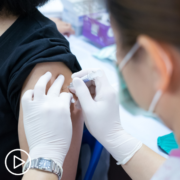
|

|

|
Transcript:
Katherine:
When making a treatment choice, what are three key considerations for AML patients?
Dr. Sallman:
Yeah, so I think the initial probably two main questions are is the patient fit or non-fit, and that’s really an evolving definition. I think historically, we had this magical age if you’re less than 60 or less than 65 years of age, but we’ve really gone past that significantly. So, does a patient have significant medical problems, decreased performance status that we would not think about intensive therapy is one of the main questions. I think what feeds into that. And the other big question is what is the underlying mutations that the patient has which really gives us a prognostic risk from a disease perspective.
With certain mutations and subgroups being much more sensitive to intensive chemotherapy and other groups really where that option is poor irrespective of age. So, I think the most important thing is how does the patient look, what is their fitness level, and what are the underlying cytogenetic and molecular changes that impact their disease.
I think third, of course, is really involving the patient in their preferences, because I think some of these can really be a decision between several options.
Katherine:
What’s the role of the patient in making treatment decisions?
Dr. Sallman:
Yeah, the patient has to be central. I’m really hoping that we’ve moved a long way from the paternalistic practices in the past.
I think there are still many instances where there’s sort of a clear best option from a medical perspective, but there’s a lot of social logistics. If you’re getting intensive therapy, as an example, you’re going to be in the hospital four to five weeks, what’s your support system? What financial, other impact factors, all of these things come into play. I think it’s a tough group. I think the patients that are, let’s say, 60 to 70, because responses are somewhat similar across non-intensive and intensive options, I think there’s the question of is the goal long-term, is the goal quality of life, and I think all of those really are impactful.
I think it can be very challenging to go through all of the specific numbers and how a patient comprehends that or not, but really trying to draw out is their goal long-term, is their goal quality of life, give them the pros and cons of the potential options in that setting, and then real-time discuss that as we go. I think when they have that buy-in from their goals, it’s important.
These are complicated regimens and patient compliance and follow-up and all that are really critical to the overall safety and good outcomes of these patients.
Katherine:
Are there questions that patients should ask in their proposed treatment plan?
Dr. Sallman:
Yeah. I think it’s always important to discuss what options. I think any time there’s a one-option, if there is a one-option, why? Maybe because standard of care in this group is so good that it’s not really reasonable to necessarily offer a main alternative regimen. I think it’s important to understand as much of the disease as possible. If you’re choosing this regimen, why are you doing it? I think asking about the mutations is important, although that’s a very complicated thing to explain. Some patients like it and some patients don’t, and I think you have to do that in your team-based relationship.
I think always asking about clinical trials is an important question to ask. Should they be getting a second opinion? These are overall very rare diseases, and we highly favor an initial consultation at an academic center that specializes in this. I’d say a majority of my patients are ultimately treated in the community. But especially given that the regimens are becoming much more complicated, the intensity of watching their counts, managing side effects, titrating medications, it’s really great to have a team-based model between academic and community centers and that can’t really ever happen if they never come to us. As much as possible for that to occur I think is important as well.
Treatment Advances for Aging AML Patients
Treatment Advances for Aging AML Patients from Patient Empowerment Network on Vimeo.
What are the latest acute myeloid leukemia (AML) treatment advances for elderly patients? Dr. David Sallman shares details about new therapies that he’s excited about and their impact on care for all AML patient groups.
Dr. David Sallman is an Assistant Member in the Department of Malignant Hematology at Moffitt Cancer Center where he specializes in myelodysplastic syndromes (MDS), acute myeloid leukemia (AML) and myeloproliferative neoplasms (MPN). Learn more about Dr. Sallman, here.
Related Resources:

|

|
Transcript:
Katherine:
Okay. When it comes to AML research and emerging treatment options, what specifically are you excited about?
Dr. Sallman:
Yeah. So, I think probably the most exciting changes have really been in the overall elderly AML setting, although I think are really broadly impactful across patients.
So, the standard has been hypomethylating agents for a long time. This paradigm has recently changed with the FDA approval and now full approval of venetoclax in combination with hypomethylating agents, but we’re still talking about immediate overall survival of 14 months in the Phase III setting.
There are lots of exciting drugs, and I think this is really where the spectrum of myelodysplastic syndrome and acute myeloid leukemia comes into play.
So, I really think in elderly AML, we’re moving towards more triplet type combinations to really ideally move the field forward. That adds levels of complexity, toxicity from additional therapies, but we’re really hoping to truly move that survival curve even more.
There’s a lot of HMA, doublet, triplet combinations that are exciting and I think that’s really where the field is going.
I think at the same time in the failure setting, particularly, let’s say, in the HMA venetoclax failure setting, there’s really a lack of almost any effective therapies. We’re really hoping that novel cellular and immunotherapies will hold significant promise in this group. There are numerous trials that are being considered in this space, but I’m hopeful for it.
What AML Patients Should Know About the COVID-19 Vaccines
What AML Patients Should Know About the COVID-19 Vaccines from Patient Empowerment Network on Vimeo.
What are some key points for acute myeloid leukemia (AML) patients to understand about the COVID-19 vaccines? Dr. David Sallman shares advice for patients who are considering the COVID-19 vaccine.
Dr. David Sallman is an Assistant Member in the Department of Malignant Hematology at Moffitt Cancer Center where he specializes in myelodysplastic syndromes (MDS), acute myeloid leukemia (AML) and myeloproliferative neoplasms (MPN). Learn more about Dr. Sallman, here.
Related Resources:
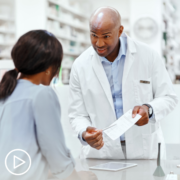
|
Transcript:
Katherine:
Are the COVID-19 vaccines safe for AML patients, and how does the vaccine affect treatment, if at all?
Dr. Sallman:
Yeah, I think that’s a great question. I think it’s really a rapidly evolving day-by-day update. For example, at our center, we vaccinated a high number of patients and we’re actually in a study trying to understand what their antibody production. So, I think the question is less ‘is it safe or not safe,’ but more is it as effective or worthwhile based on patients that have low blood counts.
I think, in general, if a patient is in remission, either post-therapy or on maintenance-type therapy that has a relatively preserved white count and is it’s very reasonable to utilize it, I think we still have the caveat of is it as effective, of course we don’t know that clearly since all the large trials, these patients weren’t really included. But in general, if you’re not severely leukopenic, we are vaccinating a high percentage of patients that we’re monitoring closely, but anecdotally, we’ve not had significant different adverse events from our perspective.



